Aboriginal
Aboriginal Education Activities

Have you ever considered the advantages of integrating Aboriginal education activities into the curriculum for students?
The rich cultural traditions and knowledge of Indigenous peoples offer unique learning opportunities that can enhance students' understanding of history, art, language, and community.
By integrating these activities into the classroom, students have the chance to engage with diverse perspectives and develop a deeper appreciation for the world around them.
Key Takeaways
- Traditional storytelling activities foster empathy and respect for diverse cultures.
- Indigenous art projects provide hands-on opportunities for artistic expression.
- Language learning initiatives utilize interactive games and immersive workshops.
- Cultural field trips immerse students in the history and traditions of Aboriginal communities.
Traditional Storytelling Activities
Engage students in traditional storytelling activities to immerse them in the rich cultural heritage of Aboriginal communities. By incorporating oral traditions into the curriculum, students can experience the interactive learning that has been integral to Aboriginal cultures for generations. Encourage students to participate in storytelling circles, where they can listen to traditional stories and even have the opportunity to share their own. This approach fosters a deep understanding of Aboriginal history and values, promoting empathy and respect for diverse cultures.
Incorporating interactive learning through traditional storytelling not only enhances students' understanding of Aboriginal communities but also provides a platform for them to engage with the material in a meaningful way. Encourage students to ask questions, discuss the stories, and reflect on the lessons and morals conveyed. By actively participating in these storytelling activities, students can develop a profound appreciation for the significance of oral traditions in Aboriginal cultures and gain insight into the values and beliefs that have been passed down through generations.
Indigenous Art Projects

Immerse students in the rich cultural heritage of Aboriginal communities by exploring Indigenous art projects that provide a hands-on opportunity to connect with traditional artistic expressions. Art workshops can serve as a gateway to cultural exploration, offering students a chance to delve into the diverse and vibrant world of Indigenous art. Through these projects, students can engage in creative expression while gaining a deeper appreciation for the history and significance of traditional Aboriginal art forms.
Participating in Indigenous art workshops allows students to actively learn about the symbolism and techniques embedded in Aboriginal art, fostering a profound understanding of its cultural context. By creating their own pieces, students not only develop their artistic skills but also gain insight into the stories and traditions behind Indigenous art forms. This hands-on approach enables students to connect with the art on a personal level, fostering a sense of respect and appreciation for the cultural significance it holds.
Through Indigenous art projects, students can gain a deeper understanding of Aboriginal culture while honing their creative abilities, making these workshops an invaluable tool for both cultural education and artistic development.
Language Learning Initiatives
Consider incorporating language learning initiatives that actively involve students in the exploration and practice of Aboriginal languages, fostering a deeper understanding of Indigenous cultures and traditions. To enhance language learning, you could implement the following strategies:
- Interactive Games: Engage students in language learning through interactive games that make learning fun and engaging.
- Immersion Workshops: Organize immersive workshops where students can be fully immersed in the Aboriginal language, allowing for practical application and accelerated learning.
- Technology Integration: Utilize language learning apps and software specifically designed for Aboriginal languages to supplement traditional teaching methods.
- Storytelling Sessions: Host storytelling sessions in the Aboriginal language to provide a cultural context and reinforce language comprehension.
- Community Involvement: Encourage interactions with fluent speakers in the community, providing real-life opportunities for language practice and cultural exchange.
Cultural Field Trips

As you broaden your students' understanding of Indigenous cultures and traditions through language learning initiatives, you can expand their experiential learning by organizing cultural field trips.
Cultural field trips offer interactive experiences that allow students to immerse themselves in the rich history and traditions of Aboriginal communities. These trips provide an opportunity for historical exploration, enabling students to engage with living Indigenous cultures in a tangible way. By visiting significant cultural sites, participating in traditional activities, and interacting with Indigenous community members, students gain a deeper appreciation for the customs, values, and practices of Aboriginal peoples.
These immersive experiences foster empathy, respect, and understanding, helping students to develop a more profound awareness of the complexities of Indigenous cultures. Furthermore, cultural field trips provide a platform for students to witness firsthand the resilience and vibrancy of Indigenous communities, challenging misconceptions and stereotypes.
Through these encounters, students can develop a more nuanced understanding of the diverse traditions and histories that shape Indigenous cultures, contributing to their holistic education and appreciation for cultural diversity.
Community Engagement Programs
To enhance your students' understanding of Indigenous cultures and traditions, consider implementing community engagement programs that actively involve them in meaningful interactions with local Aboriginal communities.
Community engagement programs offer valuable opportunities for students to immerse themselves in Aboriginal culture and gain a deeper understanding of its significance. Here are some key components to consider:
- Cultural Workshops: Organize workshops led by local Aboriginal community members to teach traditional art, music, dance, or storytelling, allowing students to actively participate and learn firsthand.
- Language Exchange: Facilitate language exchange programs where students can learn basic words and phrases from local Aboriginal languages, fostering a deeper appreciation for linguistic diversity.
- Community Service Projects: Engage students in community service initiatives within Aboriginal communities to provide practical support and build meaningful connections.
- Parent Involvement: Encourage parents to participate in cultural events or workshops, fostering a sense of community and strengthening the connection between the school and local Aboriginal families.
- Student Outreach: Provide opportunities for students to interact with Aboriginal youth through organized activities, promoting cross-cultural understanding and friendship.
Frequently Asked Questions
How Can Non-Indigenous Educators Incorporate Aboriginal Perspectives Into Their Teaching Practices?
To incorporate Indigenous perspectives into teaching, start by acknowledging the rich cultural heritage of Aboriginal communities.
Then, develop an inclusive curriculum that reflects diverse viewpoints.
Culturally responsive teaching involves understanding and respecting Indigenous values and traditions.
Language preservation, art promotion, and community engagement are key in integrating Aboriginal perspectives.
Engage with local Indigenous communities to ensure authenticity and relevance in your teaching practices.
What Are Some Ways to Respectfully Engage With Local Aboriginal Communities When Organizing Cultural Field Trips?
So, you want to plan a culturally sensitive field trip that respectfully engages local Aboriginal communities?
Start by reaching out to community leaders and involving them in the planning process. Seek their guidance and expertise to ensure the trip is respectful and culturally appropriate.
Show genuine interest and respect for their traditions and customs. Remember, community involvement is key to creating an enriching and educational experience for everyone.
Are There Any Specific Resources or Guides Available for Non-Indigenous Individuals Interested in Learning More About Aboriginal Languages?
If you're looking to learn more about aboriginal languages, there are specific resources and guides available for non-indigenous individuals. These can help you gain a deeper understanding of language preservation and the historical context of these languages.
What Are Some Ways to Support and Promote Indigenous Art and Artists Within Educational Settings?
To support indigenous artists and promote cultural representation in educational settings, engage with indigenous communities to understand their art forms and perspectives.
Encourage language preservation by incorporating indigenous languages in art classes.
Showcase indigenous artwork in school exhibitions and events to raise awareness.
Collaborate with local indigenous artists for workshops and mentorship programs.
How Can Schools and Organizations Ensure That Their Community Engagement Programs Are Inclusive and Respectful of Aboriginal Cultures and Traditions?
To ensure cultural sensitivity and community involvement, schools and organizations must prioritize inclusive education and cultural competency. Embrace diverse perspectives like a garden flourishing with various blooms.
Engage with local Indigenous communities, seek their input, and respectfully incorporate their traditions into programs. Offer opportunities for cultural exchange and education, fostering understanding and respect.
Conclusion
As you journey through the rich landscape of Aboriginal education activities, you're like a curious traveler exploring a tapestry of culture and knowledge.
Each storytelling activity, art project, language learning initiative, cultural field trip, and community engagement program is a vibrant thread woven into the fabric of understanding and respect.
Embrace the opportunity to learn and grow, and let the spirit of these activities guide you on a transformative journey of discovery.
Talise is a talented writer and an expert in her field. Her unique perspective and insights enrich our content with depth and authenticity. With a wealth of knowledge and a strong connection to the subjects she writes about, Talise crafts engaging and informative articles that resonate with our readers. Her dedication to bringing Indigenous culture and wisdom to light is truly commendable.
Aboriginal
Near Native English Speaker Meaning

As language enthusiasts, our team has encountered many individuals who have achieved a level of English proficiency that is nearly indistinguishable from that of a native speaker. One example is a person we know who grew up speaking Spanish but later lived in a country where English is the primary language during their teenage years.
The concept of near-native English proficiency raises intriguing questions about what it means to truly master a language. What are the defining characteristics of a near native English speaker, and what advantages and challenges come with reaching this level of fluency?
Join us as we explore the nuances of near-native English proficiency and delve into strategies for achieving this elusive goal.
Key Takeaways
- Near native English speakers have linguistic proficiency and cultural fluency similar to native speakers.
- Near native speakers possess accurate pronunciation, indistinguishable from native speakers.
- Near native fluency fosters a sense of cultural connection and belonging.
- Engaging in conversations with native speakers helps improve language skills.
Defining Near Native English Speaker
Defining a near native English speaker involves understanding the linguistic proficiency and cultural fluency that approaches that of a native speaker. Language acquisition plays a crucial role in achieving near native fluency. Bilingual education, when implemented effectively, can significantly contribute to this proficiency. The ability to effortlessly switch between languages, not just in terms of vocabulary and grammar, but also in understanding cultural nuances, is a key characteristic of near native English speakers.
In the realm of language acquisition, near native English speakers demonstrate a high level of proficiency in both spoken and written English. They possess a deep understanding of idiomatic expressions, colloquialisms, and cultural references, allowing them to communicate with native speakers in a manner that closely resembles natural, native-like speech. Their language skills aren't only limited to academic or formal settings but extend seamlessly into informal and everyday conversations.
Bilingual education, when integrated with cultural immersion experiences, can facilitate the development of near native English proficiency. By providing ample opportunities for language practice and exposure to diverse cultural contexts, individuals can refine their language skills and attain a level of fluency that's near indistinguishable from that of a native speaker.
Characteristics of Near Native Speakers

Near native English speakers possess a level of linguistic proficiency and cultural fluency that closely approximates that of native speakers, allowing them to seamlessly navigate both formal and informal language contexts. One of the key characteristics of near native speakers is their pronunciation accuracy. They're able to articulate sounds, intonation, and rhythm patterns of English with a high degree of precision, often to the point where their speech is indistinguishable from that of a native speaker. This level of pronunciation proficiency contributes significantly to their overall language competence.
Furthermore, near native speakers demonstrate a deep cultural understanding of the English language. They aren't only proficient in grammar and vocabulary but also understand the nuances, idioms, and cultural references inherent in the language. This cultural understanding enables them to communicate effectively in diverse social and professional settings, and to fully comprehend the subtleties of communication in English.
In essence, the characteristics of near native English speakers encompass not only linguistic capabilities but also a profound grasp of the cultural context in which the language operates.
Advantages of Near Native Fluency
Attaining near native fluency in English language and culture confers a multitude of practical and professional advantages. Our mastery of the language opens up a world of opportunities, allowing us to seamlessly navigate the cultural and communication nuances that are often barriers for non-native speakers.
Consider the following emotional and practical advantages:
- Cultural Connection
Feeling a deep sense of belonging and connection to English-speaking communities fosters a profound sense of fulfillment and acceptance. It allows us to appreciate literature, media, and the arts in their original form, enriching our cultural experiences.
- Communication Mastery
Mastering the subtle nuances and idiomatic expressions of the English language enables us to connect with native speakers on a deeper level. This fosters genuine relationships and provides a competitive edge in professional and social settings.
These advantages not only enhance our personal lives but also create significant opportunities in our professional careers. As near native speakers, we possess a unique skill set that sets us apart, opening doors to a myriad of possibilities in various industries, from education and translation to international business and diplomacy.
Challenges in Achieving Near Native Proficiency
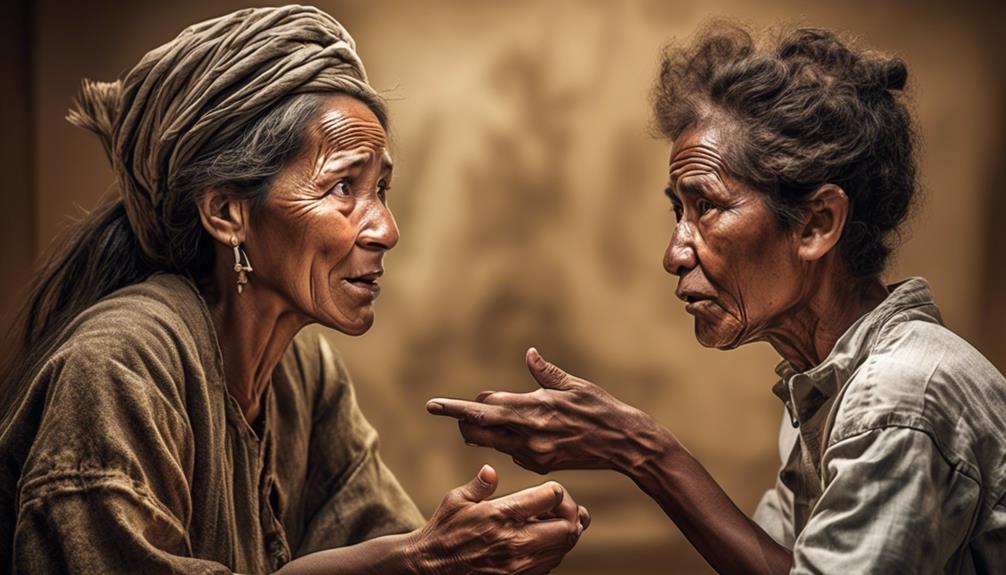
Having explored the advantages of near native fluency in the English language and culture, it's imperative to confront the challenges that accompany the pursuit of achieving such proficiency.
One of the foremost challenges in attaining near native proficiency is overcoming accent challenges. Despite possessing a strong grasp of vocabulary and grammar, non-native English speakers often struggle with acquiring a native-like accent. Pronunciation, intonation, and rhythm pose significant obstacles in achieving near native fluency.
Language immersion is often recommended as a solution to this challenge, as it allows individuals to interact with native speakers in authentic contexts, thereby refining their accent and speech patterns. However, finding opportunities for complete language immersion can be difficult, especially for individuals living in non-English-speaking countries. Additionally, sustaining language immersion over an extended period can be demanding and may require significant dedication and resources.
Overcoming accent challenges through language immersion demands perseverance and a willingness to continually engage with the English language in diverse settings. Despite these challenges, the pursuit of near native proficiency is a rewarding endeavor with the potential to greatly enhance one's communication skills and cultural understanding.
Tips for Reaching Near Native Level
To achieve near native proficiency in English, individuals can benefit from utilizing a variety of strategies and techniques to enhance their language skills. One effective approach is language immersion, which involves surrounding oneself with English through activities such as watching English television shows, reading English literature, and engaging in conversations with native speakers. This immersive experience not only enhances language proficiency but also fosters cultural understanding, allowing individuals to grasp the nuances of the language in a real-world context.
Another crucial tip for reaching near native level is developing a deep cultural understanding. This involves delving into the customs, traditions, and societal norms of English-speaking countries. By understanding the cultural context in which the language is embedded, individuals can more effectively communicate and comprehend the subtle intricacies of the language. Furthermore, immersing oneself in the culture facilitates a deeper connection with the language, making the learning process more engaging and meaningful.
Frequently Asked Questions
What Are the Common Misconceptions About Near Native English Speakers?
Common misconceptions about near native English speakers include assuming fluency equals cultural adaptation and professional opportunities. In reality, challenges exist in fully understanding idiomatic expressions and cultural nuances. Despite language proficiency, navigating professional and social environments can be difficult.
We must acknowledge the complexities of cultural adaptation and the need for ongoing learning. Mastery of English doesn't guarantee seamless integration into every aspect of a native English-speaking society.
Is Near Native Fluency the Same as Being a Native English Speaker?
Near native fluency in English is often mistaken for being a native speaker. Our language proficiency is high, but there are subtle differences that distinguish us from native speakers.
While we may possess advanced fluency, there are still certain nuances and cultural subtleties that we may not fully grasp.
It's important to recognize and embrace our near native fluency while also acknowledging the unique aspects of being a native English speaker.
Can Near Native English Speakers Easily Understand Regional Dialects and Accents?
Yes, near native English speakers can easily understand regional dialects and accents. Understanding regional dialects is essential for effective communication and cultural adaptation.
It can also enhance career prospects and dispel misconceptions about language proficiency. While there may be some communication challenges, near native fluency allows for flexibility in adapting to various accents and dialects.
This skill is crucial for navigating the diverse linguistic landscape of English-speaking communities.
How Do Cultural Differences Impact Near Native English Speakers' Communication?
Cultural differences impact near native English speakers' communication by influencing our cultural sensitivity and creating potential communication barriers. Understanding and respecting different cultural norms, customs, and communication styles is crucial.
These differences can lead to misunderstandings, misinterpretations, and conflicts. To navigate these challenges, it's important to approach communication with an open mind, willingness to learn, and adaptability.
This fosters effective cross-cultural communication and promotes mutual understanding and respect.
What Are Some Common Career Paths for Individuals With Near Native English Fluency?
Career opportunities for individuals with near native English fluency are vast. Advantages in business communication include roles in international business, diplomacy, translation, and teaching English as a second language.
These individuals have the potential to excel in global marketing, international relations, and cross-cultural communication. Their near-native fluency allows them to bridge linguistic and cultural gaps, making them valuable assets in a variety of industries.
Conclusion
In conclusion, achieving near native English proficiency is a commendable goal that offers a range of advantages.
It's estimated that only 5-10% of English language learners reach near native fluency, highlighting the rarity and difficulty of this linguistic achievement.
Despite the challenges, the benefits of near native fluency, such as increased job opportunities and improved communication skills, make the effort worthwhile.
With dedication and practice, reaching near native level is an attainable goal for many language learners.
Talise is a talented writer and an expert in her field. Her unique perspective and insights enrich our content with depth and authenticity. With a wealth of knowledge and a strong connection to the subjects she writes about, Talise crafts engaging and informative articles that resonate with our readers. Her dedication to bringing Indigenous culture and wisdom to light is truly commendable.
Aboriginal
Does Native American Grow Facial Hair

When it comes to the question of whether Native Americans are able to grow facial hair, it is like peeling back the layers of an onion – there is more complexity than meets the eye.
The topic of Native American facial hair encompasses not just biological aspects, but also delves into cultural and historical dimensions that shed light on the complexities of this subject.
From the influence of genetics and environmental factors to the significance of facial hair within different tribal traditions, the exploration of this topic unveils a tapestry of insights that challenge common misconceptions.
So, what's the real story behind Native American facial hair? Let's uncover the layers and discover the fascinating truths that lie beneath.
Key Takeaways
- Facial hair grooming practices varied among different Native American tribes, with some adorning it with designs and ornaments as a symbol of bravery, while others considered shaving it a rite of passage or left it to grow as a representation of connection to nature.
- Genetic variations and hormone levels, particularly testosterone and dihydrotestosterone, play a role in determining the potential for facial hair growth in individuals.
- Facial hair holds cultural significance in Native American communities, representing wisdom, strength, and connection to ancestors, and serving as a means of conveying individual and familial identity within tribes.
- Myths and misconceptions about Native American facial hair, such as the belief that Native American men don't grow facial hair, stem from early European encounters and a lack of understanding of the diverse genetic makeup and rich traditions of facial hair grooming among different tribes.
Historical Perspectives on Native American Facial Hair
Facial hair trends and grooming practices among Native American tribes have held significant cultural and spiritual meanings. The ways in which facial hair was groomed and styled varied among different tribes, each with its own unique customs and beliefs. For instance, the Plains tribes often adorned their facial hair with intricate designs and ornaments as a symbol of bravery and honor. In contrast, some tribes, such as the Apache, considered the act of shaving one's facial hair as a rite of passage, signifying the transition into adulthood.
Furthermore, facial hair trends were often intertwined with spiritual practices. Among the Cherokee, facial hair was left to grow as a representation of one's connection to nature and the spirit world. In other tribes, facial hair grooming was a communal activity, with elders passing down grooming techniques and traditions to the younger members of the tribe.
Understanding the historical perspectives on Native American facial hair provides insight into the diverse cultural values and traditions that have shaped indigenous communities throughout history. These grooming practices weren't merely about personal appearance, but were deeply rooted in the spiritual, social, and cultural fabric of Native American societies.
Biological Factors Influencing Facial Hair Growth

Biological factors play a significant role in influencing the growth and development of facial hair among individuals. This encompasses a range of genetic, hormonal, and physiological elements that contribute to the diversity of facial hair patterns and characteristics.
Genetic variations are fundamental in determining the potential for facial hair growth. Studies have shown that certain genes, such as the androgen receptor gene, play a crucial role in regulating the sensitivity of hair follicles to hormones. This ultimately affects the development of facial hair.
Additionally, hormonal influences, particularly androgens like testosterone and dihydrotestosterone, have a profound impact on the growth of facial hair. These hormones stimulate the hair follicles, influencing the thickness, color, and distribution of facial hair.
Moreover, the levels of these hormones can vary among different individuals due to factors such as age, sex, and overall health. This contributes to the diverse facial hair patterns observed across different populations.
Understanding these biological factors provides insight into the intricate mechanisms behind facial hair growth. It underscores the complex interplay between genetics, hormones, and physiological processes.
Cultural Significance of Facial Hair in Native American Communities
The cultural significance of facial hair in Native American communities reflects deep-rooted traditions and societal roles within their historical and contemporary contexts.
- Cultural Symbolism: Facial hair holds significant cultural symbolism in many Native American communities, often representing wisdom, strength, and connection to one's ancestors. The grooming practices associated with facial hair, such as braiding or beading, are integral parts of tribal traditions, often conveying individual and familial identity within the community. Understanding the cultural symbolism of facial hair provides insight into the complex web of traditions and values that have been passed down through generations.
- Societal Roles: Within Native American communities, the presence or absence of facial hair can signify different societal roles and stages of life. For some tribes, facial hair is associated with leadership and the responsibilities that come with it, while for others, it may symbolize the transition from adolescence to adulthood. Exploring the connection between facial hair and societal roles offers a glimpse into the multifaceted cultural dynamics within these communities.
- Historical Evolution: The cultural significance of facial hair has evolved over time, influenced by historical events, colonialism, and modern societal changes. Understanding this evolution provides a deeper appreciation for the resilience and adaptation of Native American cultural practices in the face of external pressures.
Myths and Misconceptions About Native American Facial Hair
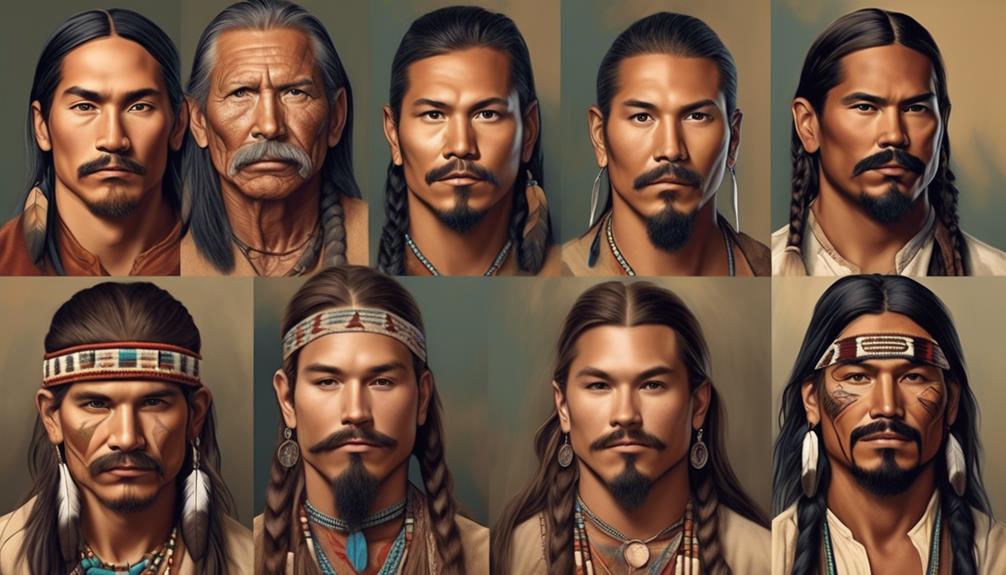
Exploring the cultural significance of facial hair in Native American communities reveals the prevalence of myths and misconceptions surrounding its meaning and historical context. One of the enduring myths is the belief that Native American men don't grow facial hair. This misconception stems from early European explorers' encounters with certain tribes who'd less facial hair due to genetic factors. However, it's essential to recognize that Native American facial hair stereotypes aren't representative of all indigenous peoples. Many tribes have a rich tradition of facial hair grooming and styling, with cultural and spiritual significance attached to facial hair.
The myths and misconceptions about Native American facial hair can be attributed to a lack of understanding of the diverse genetic makeup of indigenous populations. Genetic factors play a significant role in determining the growth patterns and density of facial hair among Native American individuals. It's crucial to dispel these misconceptions and recognize the individuality and diversity within Native American communities, including the varied expressions of facial hair.
Understanding the cultural and genetic complexities surrounding Native American facial hair is essential in debunking these myths and fostering a more accurate and respectful portrayal of indigenous peoples.
Contemporary Views on Facial Hair Among Native Americans
Contemporary views on facial hair among Native Americans reflect a dynamic interplay of tradition, personal expression, and cultural identity.
- Shift in Modern Perceptions: In contemporary society, there's been a shift in the perception of facial hair among Native Americans. While historically, facial hair was often associated with masculinity and wisdom, modern perceptions have diversified. Some individuals choose to embrace facial hair as a means of connecting with their cultural heritage, while others may opt for grooming practices that align with current fashion trends.
- Grooming Practices as Personal Expression: Grooming practices related to facial hair have become a means of personal expression for many Native Americans. The choice to grow, style, or remove facial hair is often deeply tied to individual identity and the desire to assert autonomy over one's appearance.
- Cultural Significance: Despite changing attitudes, facial hair continues to hold cultural significance for many Native American communities. It can symbolize rites of passage, connection to ancestral traditions, or spiritual beliefs, underscoring the enduring importance of facial hair within indigenous cultures.
Frequently Asked Questions
Do All Native American Men Have the Ability to Grow Facial Hair?
All men, regardless of ethnicity, have the potential to grow facial hair due to genetics. However, cultural perceptions of masculinity may influence grooming practices.
In Native American communities, facial hair may hold cultural significance, but individual ability to grow it varies. Factors such as genetics, age, and hormonal levels affect the ability to grow facial hair. It's a complex interplay of biology and cultural traditions.
Are There Any Traditional Practices or Rituals Related to Facial Hair Grooming in Native American Cultures?
In the realm of facial hair grooming, cultural traditions play a significant role in shaping societal expectations and contemporary navigation.
Across various Native American cultures, facial hair styles have been influenced by biological reasons as well as traditional practices. These customs have often been misconstrued through stereotypes, yet they hold deep cultural significance.
Understanding the historical context of facial hair grooming in Native American cultures offers a profound insight into their rich traditions.
Are There Any Specific Biological Reasons Why Some Native American Individuals May Have Difficulty Growing Facial Hair?
Facial hair genetics can vary widely among individuals, including Native Americans. While some may have difficulty growing facial hair due to genetic factors, it's important to consider the cultural significance of facial hair within different Native American tribes.
Understanding the interplay between genetics and cultural practices can provide insight into the diversity of facial hair patterns among Native American individuals.
Are There Any Specific Facial Hair Styles That Hold Particular Cultural Significance in Different Native American Communities?
Facial hair styles in Native American communities hold significant cultural importance. Traditional practices of facial hair grooming are tied to tribal customs, reflecting individual and communal identity.
However, contemporary stereotypes and societal expectations often overshadow these traditions. Despite biological reasons for some individuals having difficulty growing facial hair, the significance of facial hair in modern society is often overlooked.
Understanding and honoring these cultural practices is essential in recognizing the diversity of Native American communities.
How Do Contemporary Native American Individuals Navigate the Expectations and Stereotypes Surrounding Facial Hair in Modern Society?
In contemporary society, Native American individuals navigate cultural expectations and stereotypes surrounding facial hair with a keen awareness of identity. The significance of facial hair varies across different tribal communities, and its portrayal in media often perpetuates misconceptions.
As we analyze this complex issue, it's essential to recognize the diverse experiences and perspectives within Native American communities. Understanding the historical context and cultural significance of facial hair is crucial in dispelling stereotypes and promoting authentic representation.
Conclusion
In conclusion, the historical, biological, and cultural perspectives on Native American facial hair reveal a complex and nuanced understanding of its significance.
It's important to challenge myths and misconceptions surrounding Native American facial hair and recognize the diversity of views within indigenous communities.
By acknowledging the significance of facial hair in Native American culture, we can better appreciate and respect the traditions and customs that have shaped their identity.
Let's not let stereotypes overshadow the rich history and cultural significance of Native American facial hair.
Talise is a talented writer and an expert in her field. Her unique perspective and insights enrich our content with depth and authenticity. With a wealth of knowledge and a strong connection to the subjects she writes about, Talise crafts engaging and informative articles that resonate with our readers. Her dedication to bringing Indigenous culture and wisdom to light is truly commendable.
Aboriginal
How Did Aborigines Get to Australia

The phrase ‘every cloud has a silver lining’ is often used, and when delving into the mystery of the Aborigines’ arrival in Australia, this saying seems particularly fitting.
The journey of the first Australians to the continent is a complex and fascinating puzzle that continues to captivate researchers and enthusiasts alike. With a variety of theories and evidence pointing in different directions, the question of their arrival remains a topic of lively debate.
As we explore the various perspectives and findings, we'll uncover a rich tapestry of insights that shed light on this enduring enigma.
Key Takeaways
- Aboriginal ancestors arrived in Australia around 65,000 years ago through migration from Southeast Asia, supported by archaeological findings and genetic studies.
- Land bridges, particularly Sahul, played a crucial role in facilitating the migration of early humans to Australia during the last Ice Age.
- Ancient sea crossings, aided by maritime navigation and seafaring technologies, shaped the movement patterns of early humans and fostered the exchange of ideas, languages, and technologies.
- Technological advancements, such as the development of watercraft and navigation techniques, allowed for successful migration and influenced the development of cultures.
Ancient Arrival Theories
Ancient Arrival Theories posit various hypotheses regarding the migration of the ancestors of the Aboriginal people to Australia thousands of years ago. One prominent theory suggests that around 65,000 years ago, the first Aboriginal ancestors arrived on the Australian continent. This was during a time when sea levels were much lower, and it's believed that these early inhabitants may have used boats to navigate through Southeast Asia and eventually reached Australia. The evidence supporting this ancient migration theory includes archaeological findings of early human sites in Australia, as well as genetic studies that trace the ancestry of Aboriginal people to this time period.
Another significant aspect of the ancient arrival theories is the potential link between the migration of the Aboriginal ancestors and the megafauna extinction in Australia. Some researchers propose that the arrival of humans in Australia led to the extinction of many of the continent's megafauna, including giant kangaroos and wombats. This hypothesis suggests that the hunting practices of the early Aboriginal inhabitants may have contributed to the decline of these large animal populations. However, this theory is still a topic of debate among archaeologists and scientists.
Understanding the ancient migration of the Aboriginal ancestors and its potential impact on the environment provides valuable insights into the history and cultural heritage of Australia's indigenous population. It allows us to appreciate the deep connection between the Aboriginal people and the land, as well as the complex interactions between human migration and ecological change.
Land Bridges and Ice Age Migration

Our understanding of how Aborigines got to Australia is shaped by the Land Bridge Theory, which suggests that during the last Ice Age, lower sea levels exposed land bridges connecting the continent to Southeast Asia.
This facilitated the migration of early humans and other species. As the climate warmed and sea levels rose, ancient sea crossings may have also played a role in human migration to Australia.
Land Bridge Theory
During the last Ice Age, land bridges were formed, allowing for the migration of early human populations to Australia. The land bridge formation enabled human migration across continents, shaping ice age migration patterns.
This theory suggests that as sea levels dropped due to the formation of glaciers, land connections between continents emerged, providing pathways for human movement. The land bridge between Southeast Asia and Australia, known as Sahul, played a crucial role in the peopling of Australia.
Our understanding of ancient migration is enriched by the study of these land bridge connections, shedding light on the cultural and historical complexities of human movement. The land bridge theory offers valuable insights into the ways in which early populations navigated and settled in distant lands, contributing to the rich tapestry of human history.
Ice Age Migration
The formation of land bridges during the last Ice Age not only facilitated the migration of early human populations to Australia but also significantly influenced the patterns of human movement across continents.
Ice age migration is a complex phenomenon, and the coastal route evidence provides crucial insights into the ways in which ancient peoples navigated and adapted to changing environments.
The discovery of early human artifacts along coastal areas suggests that these populations may have utilized coastal routes to reach Australia, taking advantage of the exposed landmasses during the lower sea levels of the Ice Age. This evidence challenges previous assumptions about migration patterns and highlights the resourcefulness and adaptability of early human populations.
Understanding ice age migration not only sheds light on the history of human movement but also contributes to a more comprehensive appreciation of ancient cultures and their remarkable abilities to traverse challenging landscapes.
Ancient Sea Crossings
Ancient sea crossings and ice age migration have played a crucial role in shaping the movement patterns and cultural exchanges of early human populations across continents. Maritime navigation enabled our ancestors to traverse vast bodies of water, leading to the peopling of Australia and other remote islands. This complex process involved the use of sophisticated seafaring technologies and navigational skills, highlighting the resilience and adaptability of ancient societies.
Additionally, the megafauna extinction forced human populations to adapt their hunting and gathering strategies, triggering migrations in search of new resources. These ancient sea crossings fostered the exchange of ideas, languages, and technologies, contributing to the rich tapestry of human history and the interconnectedness of global cultures.
- Technological Advancements
- Development of watercraft
- Navigation techniques
- Adaptation to maritime environments
Genetic Studies and Ancestral Links

Recent genetic studies have provided compelling evidence for the migration of the ancestors of Aboriginal Australians to the continent. These studies have revealed shared genetic markers between Aboriginal populations and populations in Southeast Asia, supporting the ancestral links between these groups.
Through genetic analysis, researchers have been able to clarify the intricate connections between different indigenous groups and shed light on the complex history of human migration to Australia.
DNA Evidence for Migration
How do genetic studies provide evidence of ancestral links and migration patterns among the Aboriginal people of Australia?
Genetic migrations among Aboriginal populations have been revealed through mitochondrial DNA and Y chromosome studies, shedding light on their deep-rooted ancestral connections and population movements. These studies have demonstrated the genetic diversity and ancient lineages of Aboriginal people, showing connections to specific regions and dispersal patterns.
Additionally, the analysis of whole-genome data has offered insights into the timing and paths of migration, contributing to a better understanding of the complex history of Aboriginal populations.
Moreover, the examination of genetic markers has helped to identify ancestral links between Aboriginal groups and other indigenous populations, providing valuable information about their shared histories and migration routes.
Shared Genetic Markers
Genetic studies have revealed shared markers among Aboriginal populations, providing valuable insights into their ancestral links and migration history. These shared genetic markers indicate common ancestry and shed light on the migration patterns of the first inhabitants of Australia.
By analyzing the genetic diversity and distribution of these markers, researchers can infer the routes and timing of the migration of early human populations. Additionally, the identification of specific genetic adaptations within these populations offers clues about their ability to survive and thrive in diverse environments.
Understanding the shared genetic markers among Aboriginal populations not only enriches our knowledge of human evolution but also fosters a deeper appreciation for the resilience and adaptability of the first Australians in the face of changing landscapes and climates.
Ancestral Connections Clarified
Shared genetic markers among Aboriginal populations have provided valuable insights into their ancestral links and migration history, shedding light on the routes and timing of the migration of the first inhabitants of Australia.
Genetic studies have revealed fascinating details about the ancestral connections and migration patterns of Aboriginal peoples:
- Ancestral Links:
- Genetic analyses have highlighted the deep ancestral connections between Aboriginal populations, tracing back thousands of years.
- Shared genetic markers have shown common ancestry and connections between different Aboriginal groups, emphasizing the unity and interconnectedness of these communities.
- Migration Patterns:
- Studies have indicated multiple waves of migration into Australia, suggesting complex and dynamic movement patterns over time.
- Genetic evidence has provided clues about the timing and pathways of these migrations, enriching our understanding of the ancient peopling of Australia.
Island Hopping Hypothesis

After analyzing archaeological evidence and oceanic navigational capabilities, researchers propose that early human migration to Australia may have occurred through a series of deliberate island-hopping voyages. This hypothesis suggests that ancient populations used their coastal exploration and prehistoric navigation skills to navigate across the islands of Southeast Asia, eventually reaching the Australian continent. This method of migration would have required a deep understanding of ocean currents, seasonal winds, and the locations of islands, showcasing a remarkable level of maritime knowledge for the time period.
| Island Hopping Hypothesis |
|---|
| 1. Coastal Exploration |
| 2. Prehistoric Navigation |
| 3. Navigational Knowledge |
| 4. Southeast Asian Islands |
| 5. Migration to Australia |
The island-hopping hypothesis challenges the traditional notion of accidental drift voyages or purposeful open-sea navigation straight to Australia. Instead, it suggests that early migrants intentionally traveled between islands, establishing temporary or permanent settlements along the way. This theory aligns with the rich oral traditions of Aboriginal Australians, which tell of ancient journeys and connections to neighboring lands. Furthermore, it emphasizes the advanced seafaring capabilities of early humans and the significance of maritime culture in shaping ancient migration patterns.
This hypothesis not only offers a compelling explanation for the peopling of Australia but also sheds light on the ingenuity and adaptability of our ancestors. It invites us to reconsider the ways in which ancient communities navigated and interacted with their environments, encouraging a deeper understanding of human history and cultural evolution.
Indigenous Oral Histories
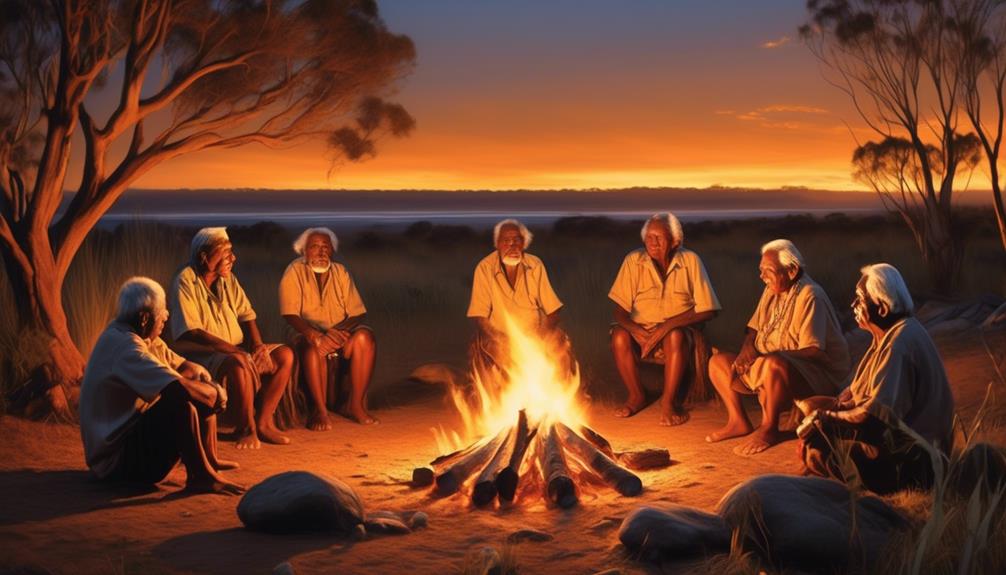
Indigenous oral histories are invaluable sources of cultural knowledge that have been passed down through generations. These oral traditions serve as a means of preserving and transmitting important information about a community's history, customs, and values.
The art of storytelling plays a crucial role in maintaining the rich tapestry of Indigenous cultures and should be recognized for its significance in preserving heritage.
Oral History Preservation
Preserving Indigenous oral histories is a crucial endeavor for safeguarding the cultural heritage and traditions of Aboriginal peoples in Australia. This preservation is vital for maintaining the authenticity of their knowledge transmission techniques and ensuring the continuity of their rich narratives.
To achieve this, various preservation methods are being employed, including:
- Digital Archives: Utilizing modern technology to record and store oral histories, ensuring their accessibility for future generations.
- *Community Involvement*: Engaging Aboriginal communities in the documentation and preservation process, respecting their autonomy and authority over their own narratives.
- *Cultural Institutions Support*: Collaborating with cultural institutions to develop ethical guidelines and protocols for preserving and sharing Indigenous oral histories, respecting the sacred nature of these stories.
Cultural Knowledge Transmission
Utilizing traditional storytelling methods, Aboriginal communities in Australia intricately weave their cultural knowledge into oral histories, ensuring the preservation and transmission of their rich heritage across generations.
Cultural transmission within Indigenous Australian communities is a complex process that involves the passing down of knowledge through storytelling, ceremonies, and artistic expressions. These oral histories serve as a means for preserving traditional practices, spiritual beliefs, and the wisdom of the elders.
Through this intergenerational exchange, the continuity of cultural traditions is maintained, fostering a strong sense of identity and belonging within the community. Furthermore, the oral transmission of knowledge allows for the adaptation and evolution of cultural practices, ensuring their relevance in contemporary contexts.
It's through these oral histories that the resilience and vibrancy of Aboriginal cultures are sustained, contributing to the preservation of their unique heritage.
Importance of Storytelling
Drawing upon the rich tapestry of cultural knowledge transmitted through oral histories, Aboriginal communities in Australia intricately weave the significance of storytelling as a vital vessel for preserving and perpetuating their heritage.
- Preservation Techniques
- Storytelling serves as a mechanism for encoding and preserving Indigenous knowledge, ensuring its continuity across generations.
- Through the art of oral storytelling, traditional practices, beliefs, and values are safeguarded from erosion and loss.
- Indigenous Knowledge Transmission
- Storytelling fosters intergenerational learning, allowing for the seamless transmission of ancestral wisdom and historical accounts.
- The oral tradition enables the preservation of linguistic diversity and ensures the survival of Indigenous languages, which are intrinsic to the narratives shared.
Storytelling, embedded in Indigenous culture, is a powerful tool for the maintenance and transmission of knowledge, offering a profound insight into the historical and cultural legacy of Aboriginal communities.
Archaeological Discoveries
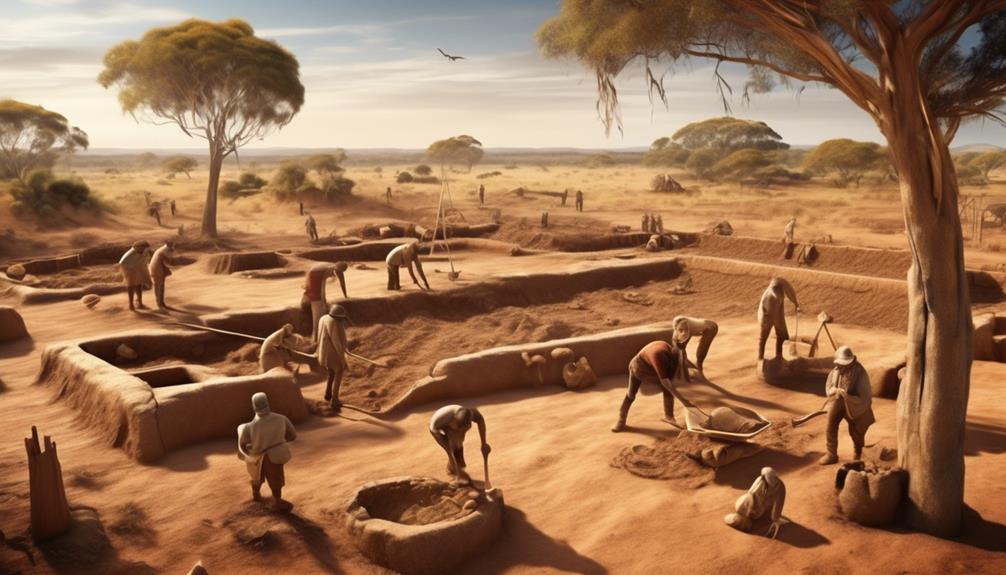
Based on recent archaeological discoveries, it becomes evident that the migration of Aborigines to Australia occurred at least 65,000 years ago. Archaeological excavations have unearthed cultural artifacts such as stone tools, shell beads, and rock art that provide crucial evidence of the ancient settlement patterns and migration routes of the first Aboriginal peoples. These findings challenge previous beliefs about the timeline of human migration and settlement in Australia.
The discovery of ancient tools and artifacts in various locations across Australia, including the Madjedbebe rock shelter in the Northern Territory, indicates a sophisticated adaptation to different environments. The tools and artifacts suggest a high level of technological advancement and cultural complexity among the early Aboriginal inhabitants. Additionally, the presence of these artifacts in diverse ecological settings suggests that the migration and settlement patterns weren't haphazard but rather followed intentional and well-planned routes.
Understanding the ancient settlement patterns and migration routes of the Aboriginal peoples is crucial for appreciating the depth of their history and the richness of their cultural heritage. These archaeological discoveries not only provide insights into the earliest human societies in Australia but also challenge mainstream narratives about human migration and the development of complex societies.
Maritime Navigation Techniques
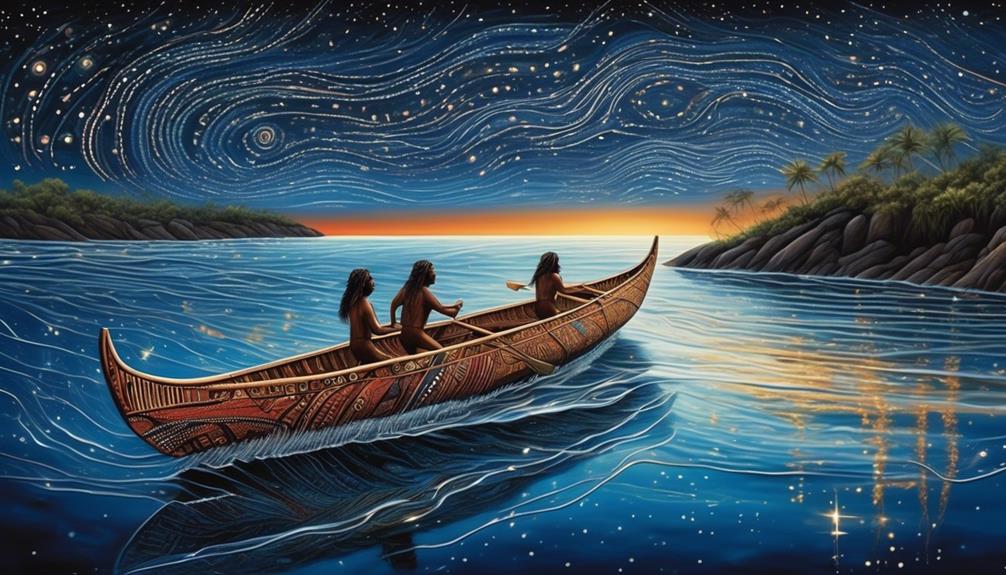
Our exploration of the migration of Aborigines to Australia prompts an investigation into the maritime navigation techniques employed by these early seafarers. The ability of Indigenous Australians to navigate vast oceanic distances to reach Australia reflects a sophisticated understanding of celestial navigation techniques and traditional maritime knowledge.
- Celestial Navigation Techniques
Indigenous seafarers utilized celestial bodies such as stars, sun, moon, and even specific constellations to determine direction and location. This intricate understanding of celestial navigation enabled them to navigate across open waters with precision, even in the absence of modern navigational instruments.
- Indigenous Seafaring Traditions
The maritime navigation techniques of Indigenous Australians were embedded within their cultural practices and traditions, passed down through generations. These traditions encompassed not only the technical aspects of navigation but also the spiritual and cultural significance of seafaring, emphasizing a holistic understanding of the ocean and its navigation.
- Navigation Tools and Traditional Maritime Knowledge
Indigenous Australians developed and utilized various navigation tools such as stick charts, shells, and other natural materials, which played a significant role in their navigation across the vast expanses of the Pacific Ocean. Moreover, traditional maritime knowledge encompassed a deep understanding of ocean currents, wind patterns, animal behavior, and environmental cues, all of which contributed to their successful navigation.
The maritime navigation techniques of early Indigenous Australians exemplify a profound connection to the natural world and a remarkable mastery of navigating the seas, demonstrating their advanced understanding of the maritime environment and their ability to traverse great distances with ingenuity and skill.
Ancient Seafaring Technology
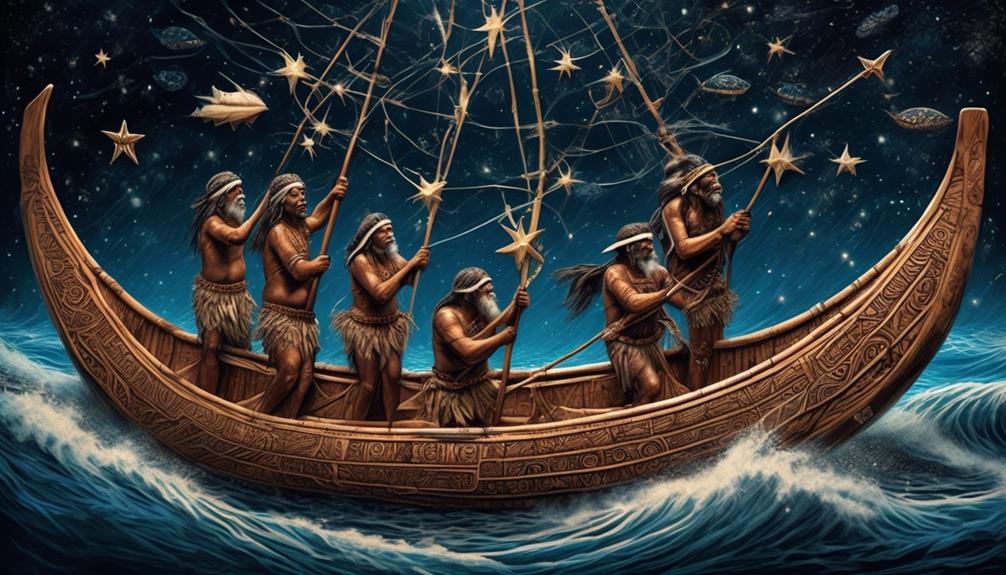
Utilizing sophisticated maritime technology, ancient seafarers navigated the vast oceans with remarkable precision and skill, reflecting a deep understanding of the maritime environment and its challenges. The ancient seafaring technology utilized by these early mariners was a testament to their ingenuity and adaptability. Their ability to traverse long distances across open waters, often without the aid of modern navigational tools, is a testament to their advanced knowledge of celestial navigation, ocean currents, and weather patterns.
Through the use of traditional navigation methods such as celestial navigation, landmark identification, and oral navigational lore, ancient seafarers were able to undertake long and perilous journeys with astounding accuracy.
Maritime technology of the ancient world encompassed a wide range of tools and techniques, including the development of watercraft suited for open-sea travel, the creation of navigational aids such as charts and maps, and the utilization of observational astronomy for determining latitude and longitude. These advancements in maritime technology allowed ancient seafarers to venture into the unknown, expanding their cultural and commercial horizons. Their mastery of ancient navigation techniques not only facilitated trade and cultural exchange but also paved the way for future explorations and migrations.
Understanding the intricacies of ancient seafaring technology provides valuable insights into the capabilities and accomplishments of early maritime societies. It highlights the resourcefulness and resilience of ancient seafarers who, armed with their knowledge and expertise, bravely ventured into the vast and unpredictable expanse of the open ocean.
Climate Change and Coastal Routes

As we consider the migration of Aborigines to Australia, the evidence of coastal routes becomes a crucial element in understanding their journey.
The impact of changing sea levels due to climate change offers insights into the feasibility and timing of such migrations.
Coastal Route Evidence
During periods of climate change, coastal routes may have played a significant role in the migration of early human populations to Australia. Coastal route migration is supported by evidence of prehistoric seafaring techniques, indicating that ancient humans could have traveled along coastlines using boats or rafts. This method would have allowed them to navigate through changing landscapes and access new territories, including Australia.
The discovery of early human artifacts along coastal regions further suggests the plausibility of this migration route. Additionally, genetic studies of Aboriginal populations have provided insights into their deep-rooted connection to coastal regions, supporting the hypothesis of coastal migration.
These findings underscore the importance of considering coastal routes in understanding the complex and dynamic history of human migration to Australia.
Impact of Sea Levels
The evidence of prehistoric seafaring techniques highlights the significant impact of sea levels on coastal routes and human migration to Australia. Sea level fluctuations have played a crucial role in shaping the environmental impact and ancient settlement patterns of the continent.
As sea levels varied over millennia, coastlines shifted, creating opportunities for migration and posing challenges for early inhabitants. These fluctuations influenced the availability of coastal resources and the suitability of routes for human migration.
Understanding the complex interplay between sea level changes and human migration is essential for comprehending the history of ancient settlement in Australia. It offers valuable insights into how early populations navigated and adapted to the dynamic coastal landscapes, shedding light on the resilience and resourcefulness of the first Australians in the face of environmental challenges.
Migration Timing Implications
Examining the implications of climate change and coastal routes on the timing of migration offers valuable insights into the adaptive strategies of ancient populations in navigating and settling in Australia. This analysis sheds light on the implications of early arrival, as well as the environmental adaptation challenges faced by these early migrants.
- Impact of Sea Levels: Understanding the fluctuation of sea levels and its impact on coastal routes provides crucial context for evaluating migration timing.
- *Coastal Navigation Techniques*: Exploring the techniques utilized by ancient populations for coastal navigation can reveal their resourcefulness in overcoming environmental challenges.
- *Cultural Resilience*: Investigating how cultural traditions and knowledge were leveraged to adapt to changing coastal landscapes offers a deeper understanding of the resilience of these early populations.
- *Resource Management*: Delving into how ancient populations managed resources in response to environmental changes can provide insights into their adaptive capabilities.
Megafauna Extinction Connection

New evidence supports the theory that the arrival of humans in Australia is linked to the extinction of the continent's megafauna. The timing of human migration to Australia coincides with the decline and eventual extinction of many large animal species, known as megafauna. This correlation has sparked debate over whether human activity, environmental changes, or a combination of both factors contributed to the megafauna extinction.
| Megafauna Extinction Theories | Description |
|---|---|
| Overhunting | This theory posits that the rapid increase in human population led to the overexploitation of megafauna for food, resulting in their extinction. |
| Environmental Changes | The environmental changes theory suggests that alterations in the landscape due to climate variability or human activity led to the decline of megafauna habitats and food sources. |
| Coexistence | Some researchers propose that while human arrival may have impacted megafauna, the two coexisted for a significant period before the extinction, indicating that other factors may have played a more significant role. |
The megafauna extinction and its connection to human arrival in Australia are essential topics of discussion as they shed light on how human activity can impact ecosystems. Understanding the complex interplay between human migration, environmental changes, and megafauna extinction is crucial for learning from the past and making informed decisions about conservation and sustainability. By examining these historical events, we can gain insights into the delicate balance between human societies and the natural world, leading to a more liberated and environmentally conscious future.
Adaptation to New Environments

Researchers have identified various cultural and technological adaptations employed by early human populations as they navigated and settled into the diverse environments of Australia. The cultural adaptation of the Aboriginal people to the new environment was crucial for their survival and development. Here are the key cultural and technological adaptations that enabled the early human populations to thrive in the challenging Australian landscapes:
- Use of Fire: The controlled use of fire was a crucial cultural adaptation that allowed Aboriginal people to manage the landscape, promote new growth, and facilitate hunting.
- Tool Innovation: Early inhabitants of Australia demonstrated remarkable technological adaptations by crafting specialized tools suited to the unique environments they encountered, such as the development of complex tools for hunting and food processing.
- Social Organization: The Aboriginal people developed intricate social structures that facilitated cooperation and knowledge sharing, enabling them to adapt to different ecological niches and climates.
These cultural adaptations reflect the environmental resilience of the early human populations in Australia. The ability to adapt culturally and technologically allowed them to thrive in diverse and often harsh environments. The resilience and adaptability of Aboriginal cultures demonstrate the depth of human ingenuity and the capacity for innovation in the face of environmental challenges.
Understanding these cultural and technological adaptations provides valuable insights into the history and development of human societies in Australia.
Early Settlement Evidence

The cultural and technological adaptations of the Aboriginal people in managing the landscape and promoting new growth provide key insights into the early settlement evidence in Australia. Archaeological discoveries have shed light on the ways in which the Aboriginal people adapted to new environments over time. These discoveries have revealed sophisticated tools and methods used for hunting, cooking, and building shelters, indicating a deep understanding of the natural resources available in different regions.
Additionally, the impact of sea levels on early settlement evidence is evident in the remnants of ancient coastal settlements that have been uncovered by researchers. These sites offer valuable clues about the lifestyles and migration patterns of the early Aboriginal inhabitants.
Furthermore, the adaptation to new environments is demonstrated through the diversity of tools and artifacts found across various regions of Australia. The differences in materials and construction techniques reflect the resourcefulness and adaptability of the Aboriginal people as they navigated and settled in diverse landscapes.
The early settlement evidence also highlights the significance of oral traditions and storytelling as a means of passing down knowledge of land management and survival strategies through generations.
Cultural Connections to Southeast Asia

With evidence of cultural practices and linguistic similarities, the enduring connections between Aboriginal communities and Southeast Asia are indicative of a deep-rooted historical and cultural exchange. These connections provide valuable insights into the complex web of Indigenous migration routes and the diverse ways in which cultures have intertwined over millennia.
- Cultural Practices: The presence of intricate rock art, use of specific tools, and shared mythological motifs between Aboriginal communities and Southeast Asian cultures underscores the enduring cultural connections. These similarities suggest a sustained and meaningful exchange of knowledge and practices.
- Linguistic Similarities: Linguistic research has revealed striking similarities between certain Aboriginal languages and those spoken in parts of Southeast Asia. These linguistic connections offer compelling evidence of historical ties and interactions between the two regions, pointing to long-standing cultural exchanges.
- Material Culture: Archaeological findings of similar stone tools, pottery styles, and burial practices in both regions further emphasize the enduring cultural connections and exchange between Aboriginal communities and Southeast Asia. These material cultural similarities indicate a sustained and reciprocal transfer of knowledge and technologies, shaping the identities of both regions.
These cultural connections to Southeast Asia provide a deeper understanding of the historical and cultural exchange that has shaped the identities of Aboriginal communities and the broader Southeast Asian region. They illustrate the intricate web of Indigenous migration routes and highlight the rich tapestry of connections that have endured over time.
Ancient Trade and Exchange Networks

Evidence of ancient trade and exchange networks illuminates the interconnectedness of diverse cultures and the enduring impact of historical interactions. The trade routes that crisscrossed the ancient world facilitated not only the movement of goods but also the exchange of ideas, technologies, and cultural practices.
In the context of the migration of the Aborigines to Australia, these trade routes played a crucial role in shaping the cultural landscape of the region and in providing the means for their eventual arrival.
The interconnected web of trade routes, spanning from Southeast Asia through the Indonesian archipelago and into Australia, allowed for the exchange of materials such as volcanic glass, known as obsidian, and other resources. This trade facilitated the movement of people and ideas, contributing to the rich tapestry of cultural exchange that characterized the region. The intricate networks of interaction and exchange weren't only vital for the sustenance of communities but also for the transmission of social, religious, and technological innovations.
The cultural exchange that occurred along these trade routes wasn't a one-way process but rather a dynamic and reciprocal interaction, where different societies contributed to and benefitted from the amalgamation of knowledge and practices. This exchange of goods and ideas across vast distances underscores the sophisticated systems of navigation, communication, and diplomacy that existed in ancient times.
Understanding the dynamics of ancient trade and exchange networks provides valuable insights into the complex and interconnected histories of diverse cultures, shedding light on the enduring impact of historical interactions.
Human Evolution and Migration Patterns

Ancient trade and exchange networks reveal a complex web of interactions and cultural interconnections, providing valuable insights into the patterns of human evolution and migration across diverse regions. Human migration is a remarkable saga of adaptation and resilience, marked by the interplay of evolutionary genetics, ancient seafaring techniques, and climate change adaptation. Coastal route evidence suggests that early humans navigated the seas, dispersing across continents and islands. This underscores the significance of maritime capabilities in shaping the human story.
- *Evolutionary Genetics*: Genetic studies have unraveled the intricate tapestry of human migration, highlighting the movements of ancient populations and their genetic legacies in present-day communities. These findings offer profound insights into the interconnectedness of human populations and the dynamics of migratory patterns.
- *Ancient Seafaring Techniques*: The mastery of ancient seafaring techniques, such as navigation by the stars and knowledge of ocean currents, facilitated the expansion of human populations to distant lands. This underscores the ingenuity of our ancestors and their ability to adapt to diverse environments.
- *Cultural Exchange Networks*: The exchange of ideas, technologies, and cultural practices within and between different human groups played a pivotal role in shaping migration patterns. These cultural exchange networks fostered the transmission of knowledge and innovations, contributing to the rich tapestry of human diversity and interconnectedness.
Understanding human evolution and migration patterns provides a lens through which we can appreciate the shared heritage of humanity, transcending geographical boundaries and celebrating the resilience and ingenuity of our ancestors.
Frequently Asked Questions
What Were the Specific Routes and Methods Used by the Ancient Aborigines to Navigate to Australia?
Ancient navigation and migration patterns of the aborigines to Australia are fascinating. Their journey was a testament to incredible seafaring skills and a deep understanding of the land and sea.
The specific routes and methods used by the ancient aborigines to navigate to Australia reflect their connection to the environment and their ability to adapt and thrive in diverse landscapes.
Their migration patterns offer valuable insights into their rich cultural history and resilience.
How Did the Megafauna Extinction in Australia Impact the Migration and Settlement Patterns of the Early Aborigines?
The megafauna extinction in Australia significantly impacted the migration and settlement patterns of the early Aborigines. As they adapted to new ecosystems, they adjusted their navigation methods and cultural connections with Southeast Asia.
This shift is evident in the evidence of human evolution and migration. The loss of megafauna influenced their cultural perspective and affected their liberation, shaping their journey and settlement in Australia.
What Cultural and Trade Connections Did the Early Aborigines Have With Other Southeast Asian Societies?
Cultural connections between early Aborigines and Southeast Asian societies were robust and diverse. Trade networks facilitated the exchange of goods, technologies, and cultural practices, enriching both communities.
The intricate web of connections fostered a sense of belonging and mutual understanding, transcending geographical boundaries. These exchanges were vital for shaping the cultural identity of the early Aborigines and Southeast Asian societies, illustrating the power of human interaction and exchange in shaping civilizations.
How Did the Early Aborigines Adapt to the New Environments and Ecosystems They Encountered in Australia?
Adapting to new environments and ecosystems posed significant challenges for early Aboriginal communities. Environmental changes required us to develop innovative strategies for survival. This process encompassed a deep understanding of the land, its resources, and the complex interactions within the ecosystem.
Our cultural perspective emphasizes the importance of respecting and harmonizing with nature. Through this lens, we navigated the adaptation challenges brought about by the unique Australian landscape.
What Specific Evidence Exists for the Human Evolution and Migration Patterns of the Ancient Aborigines?
Genetic evidence and archaeological findings provide insights into the human evolution and migration patterns of ancient Aborigines. Climate change and land bridges played pivotal roles in their journey to Australia. These factors influenced their adaptation to diverse environments and the development of unique cultural practices.
Our research underscores the significance of understanding these migration patterns in appreciating the rich history and cultural heritage of the ancient Aborigines.
Conclusion
In conclusion, the fascinating journey of how the Aboriginal people arrived in Australia is a complex and awe-inspiring tale of ancient migration, cultural connections, and human evolution.
From land bridges and ice age migration to genetic studies and indigenous oral histories, the story of their arrival is a testament to the resilience and adaptability of the human spirit.
The depth of their ancestral links and early settlement evidence only adds to the richness of their cultural heritage.
Talise is a talented writer and an expert in her field. Her unique perspective and insights enrich our content with depth and authenticity. With a wealth of knowledge and a strong connection to the subjects she writes about, Talise crafts engaging and informative articles that resonate with our readers. Her dedication to bringing Indigenous culture and wisdom to light is truly commendable.
-
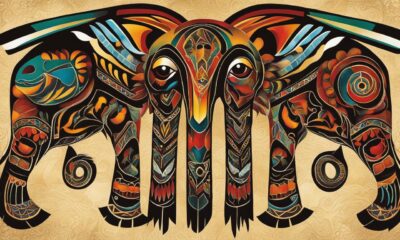
 Culture2 weeks ago
Culture2 weeks agoUnderstanding Aboriginal Totem Significance
-

 Torres Strait Islanders8 hours ago
Torres Strait Islanders8 hours agoSacred Healing: Discovering Indigenous Health Secrets
-

 Torres Strait Islanders8 hours ago
Torres Strait Islanders8 hours agoJourney to Wellness: Indigenous Health Product Guide
-

 Torres Strait Islanders9 hours ago
Torres Strait Islanders9 hours agoCultural Vitality: Indigenous Health Tips
-

 Torres Strait Islanders8 hours ago
Torres Strait Islanders8 hours agoEmbrace Indigenous Wisdom: Top Well-Being Products
-

 Torres Strait Islanders8 hours ago
Torres Strait Islanders8 hours agoHolistic Health: Indigenous Wellness Explored
-
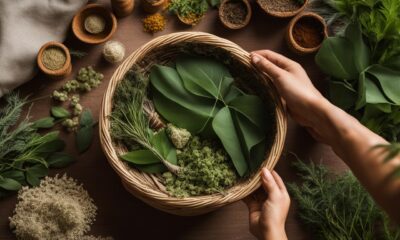
 Torres Strait Islanders8 hours ago
Torres Strait Islanders8 hours agoNature’s Wisdom: Indigenous Well-Being Remedies
-

 Torres Strait Islanders8 hours ago
Torres Strait Islanders8 hours agoIndigenous Health Products Guide for Wellness












